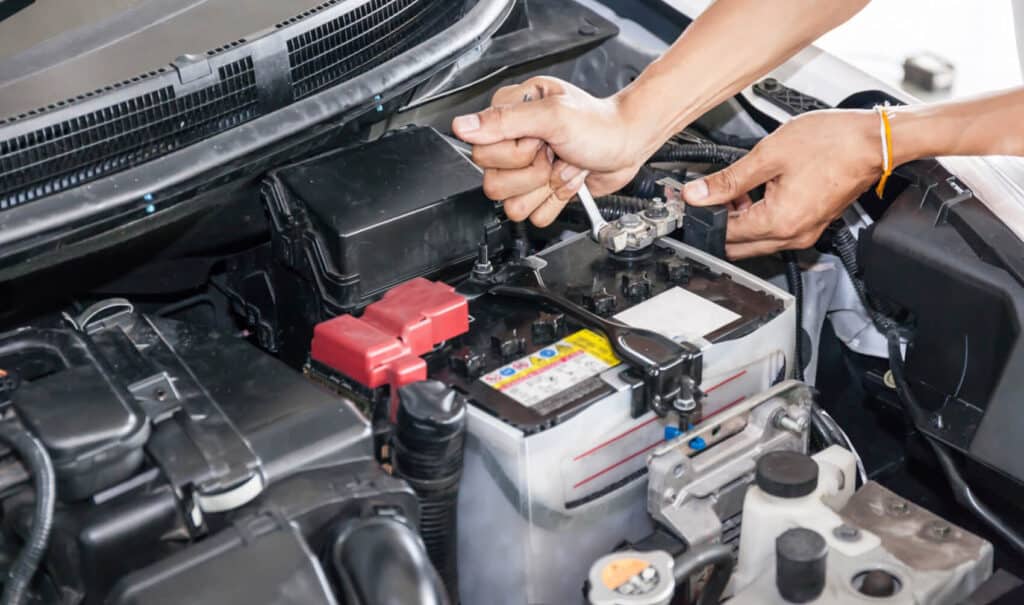What is a Car Battery?
A car battery is a vital component of a car’s electrical system. It provides the necessary electrical power to start the engine, power the lights, and run the electrical systems when the car is off. Car batteries are rechargeable, with the charging primarily provided by the car’s alternator once the vehicle is running.
How Much Will it Cost to Replace a Car Battery in Canada?
In Canada, the cost to replace a car battery will depend on the make and model of the vehicle and the type of battery it requires. On average, a new car battery can range from $100 to $300 for the parts. The labour cost can vary, but it usually takes less than an hour for a professional to complete the job. So, you may expect to pay around $50 to $100 for the labour. This means the total cost can range from $150 to $400.

What are the Symptoms of a Faulty Car Battery?
• Difficulty starting the vehicle: One of the most common symptoms of a faulty car battery is experiencing trouble when you try to start the vehicle. The engine may crank slowly, or it may not crank at all. This happens because the battery doesn’t have enough power to turn the starter motor and ignite the engine.
• Electrical components not functioning properly: The battery supplies electricity to all the electrical components in the car, including the lights, radio, power windows, and more. If these components are not functioning as they should, or if they are working intermittently, it could be a sign that the battery is not providing a consistent supply of electricity.
• The battery warning light is on: Most vehicles have a battery warning light on the dashboard that illuminates when the car’s electrical system is not functioning properly. While this light can indicate a number of issues, a common cause is a faulty or failing battery.
• Swollen battery case: A car battery case can swell due to excessive heat. Overcharging can cause the battery to heat up, leading to the swelling of the case. The excessive heat can cause the flat plates inside the battery to warp and lose their ability to hold a charge.
• Battery leakage: If you notice a corrosive substance or an acid smell around the battery or see that it is wet, it’s likely that the battery is leaking. Battery leakage can cause corrosion on the terminals, making it harder for the battery to connect with the car’s electrical system. This can lead to a variety of problems, including difficulty starting the car and malfunctioning electrical components.
How Long Does a Car Battery Last?
A typical car battery will last between 3 to 5 years, but this can vary based on several factors including the quality of the battery, the driving conditions, and how well the vehicle is maintained.
How Does a Car Battery Become Defective?
• Regular wear and tear: Just like any other component in your vehicle, car batteries are subject to wear and tear. Over time, this can result in reduced capacity and performance.
• Repeated deep discharges: Frequently draining your car battery to a very low level can cause significant damage. Each discharge and recharge cycle wears down the battery, reducing its overall lifespan.
• Short drives: If you frequently take short drives, your car’s alternator may not have enough time to recharge the battery fully after the energy expended to start the car. This consistent undercharging can lead to sulfation, where sulfur deposits form on the lead plates inside the battery, impeding its ability to hold a charge.
• Extreme temperatures: Both very hot and very cold temperatures can be harmful to car batteries. Heat can speed up chemical activity inside the battery but also accelerates internal corrosion. On the other hand, cold temperatures can slow down the chemical reactions inside the battery, reducing its ability to provide sufficient power.
• Poor maintenance: Failing to maintain the battery can also cause it to become defective. This can include allowing corrosion to build up on the terminals or not keeping the battery securely fastened, causing it to vibrate and potentially leading to internal damage.
• Electrical issues: Electrical faults in the vehicle, such as a malfunctioning alternator or problems in the electrical system, can cause the battery to drain quickly or not charge correctly, leading to failure.
How Can a Faulty Car Battery Affect Other Systems in the Car?
• Difficulty starting the vehicle: The primary role of the battery is to provide the initial power to start the engine. If the battery is faulty, the car may not start, or it might require several attempts.
• Dim or flickering lights: The car’s battery powers the lighting system. When the battery is failing, headlights, tail lights, and interior lights may become dim or flicker, reducing visibility and safety.
• Electrical components not functioning properly: The battery provides power to various electrical components in the vehicle, such as the radio, power windows, windshield wipers, and air conditioning. A faulty battery can cause these systems to perform inconsistently or not function at all.
• Battery warning light on the dashboard: Modern vehicles have a battery warning light on the dashboard which illuminates if the battery isn’t charging properly or if there is an issue with the electrical system. If the battery is faulty, this light may come on.
• Unexpected vehicle shutdown: In severe cases, a faulty battery can lead to complete electrical failure, causing the vehicle to shut down unexpectedly. This could occur while driving, posing a significant safety risk.

Is it Safe to Drive with a Faulty Car Battery?
It is not advisable to drive with a faulty car battery. A malfunctioning battery can lead to unpredictable engine performance, which includes stalling or refusing to start. These issues could potentially leave you stranded in inconvenient or even hazardous locations.
Furthermore, a faulty car battery can compromise the functionality of the vehicle’s electrical system. This could affect various components such as the lighting, radio, air conditioning, and more importantly, critical safety systems like ABS and power steering. Therefore, for your safety and the reliability of your vehicle, it’s crucial to replace a faulty car battery promptly.
How Can I Make My Car Battery Last Longer?
• Ensure your vehicle is serviced regularly
• Avoid short drives that prevent the battery from fully recharging
• Keep the battery clean and free of corrosion
• Try to park in shaded or covered areas to protect the battery from extreme temperatures
Can a Mobile Mechanic Replace a Car Battery?
Yes, a mobile mechanic can definitely replace a car battery. They have the necessary tools and expertise to carry out the job safely and efficiently at your preferred location.
Conclusion
A car battery is a critical component of your vehicle’s operation. It’s important to monitor for signs of a faulty battery and replace it when necessary. Regular maintenance and careful use can extend the life of your car battery. Remember, professional mechanics are always available to help, whether at a service center or on-site through mobile services.
Next Steps: Book Your Battery Clamp Replacement Service
The service most frequently booked by those who read this article is Battery Clamp Replacement. Uchanics’ expert technicians make the process even more convenient by bringing the service right to your doorstep. We perform this job at your home or office, covering over 40 cities in Ontario, including Oshawa, Ajax, Toronto, Scarborough, Mississauga, Brampton, and more. Our commitment to excellence has earned us more than 700 glowing 5-star reviews. Choose Uchanics for your Battery Clamp Replacement and experience unparalleled convenience and top-quality service.
